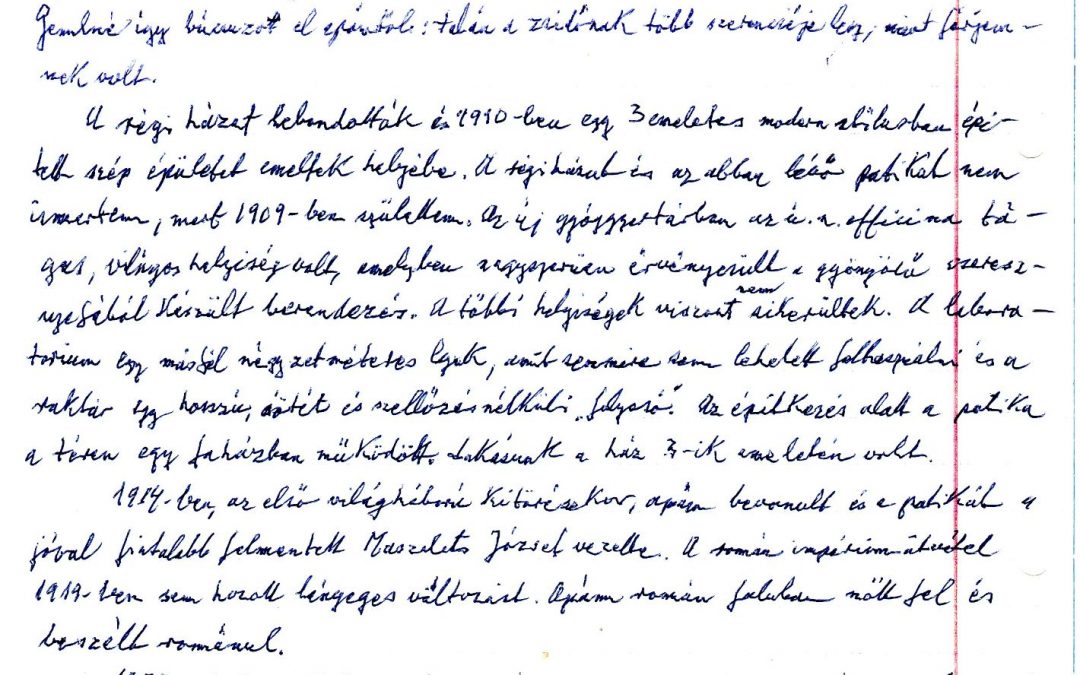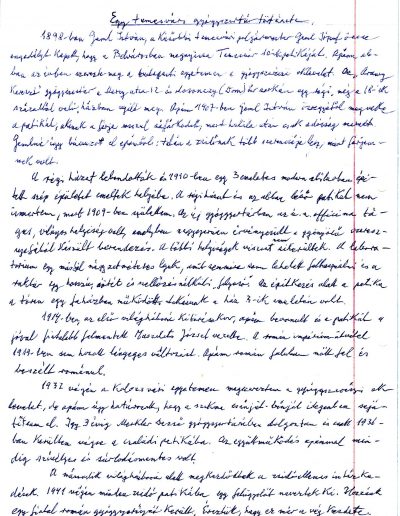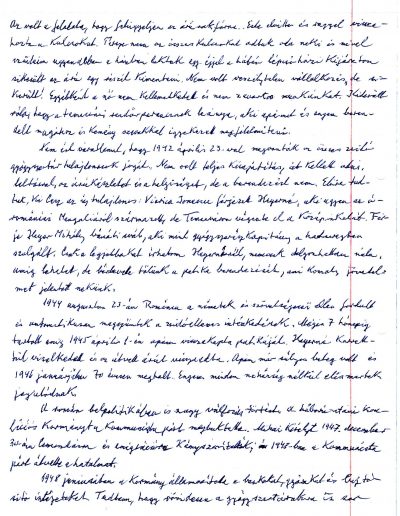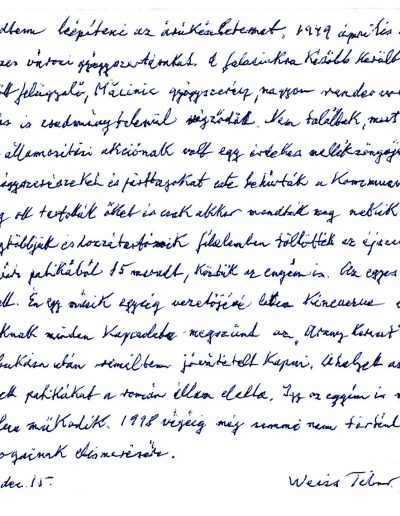The history of a pharmacy in Timișoara.
By Tibor Weiss 15 decembrie 1998(Traducere din maghiară: Getta Neumann)
The manuscript of the text written by Tibor Weiss, 1998
In 1898, Ştefan Geml, the brother of Iosif Geml who later became mayor, received authorization to set up a pharmacy in Timişoara, in the Citadel neighborhood. The "Arany Kereszt" (Golden Cross) pharmacy, the tenth in the city, opened on the corner of Mercy Street and Losonczy Square (or Domtér, since 1919, Union Square), in an 18th-century house. My father, who had graduated as a pharmacist in Budapest in 1898, bought the pharmacy in 1907 from the widow of Stefan Geml, who had run it so disastrously that he left behind only debts. Mrs. Geml said goodbye to her father with the words, "A Jew may be more fortunate than my husband."
In 1910 the building was demolished and in its place a beautiful three-storey building was erected, in modern style. I do not know the old building or the pharmacy of that time, I was born in 1909. In the spacious and bright room of the new pharmacy, the splendid cherry wood furniture was well highlighted. (...) During construction, the pharmacy continued to operate on the market, in a wooden house, and our house was on the 3rd floor.
In 1914, when World War I broke out, my father was recruited, and the pharmacy was run by József Maszeletes, who was exempt from military service. The fact that in 1919 Romania came under the Romanian administration did not cause fundamental changes. My father had grown up in a Romanian village and spoke Romanian.
In 1932 I graduated as a pharmacist at the University of Cluj, but my father decided to teach all the tricks of the trade to a specialist other than himself. For three years I worked in Dezsö Merkler's pharmacy and only in 1936 did I start working in the family pharmacy. Working with my father has always been enjoyable and frictionless.
Anti-Semitic measures began during World War II. At the end of 1941, a supervisor was appointed for each Jewish-owned pharmacy. I could feel the end approaching. A young Romanian pharmacist came to us. Her job was to oversee the stockpile. In the evening she would take the keys and bring them back the next morning, but of course I would not give her all the keys. My parents, living in the same house, managed one night to save some of the cargo by going out from behind. The enterprise was not without risk, but it succeeded! In fact, the pharmacist the pharmacist did not bother us and did not disturb us in the activity. It turned out that she was the daughter of the head of the gendarmerie in Timişoara, who summoned my father and me and tried to scare us with threats.
It came as no surprise that on April 23, 1942, all Jewish pharmacists had their licenses revoked. It was not a total expropriation, we had to hand over the goods and the premises with an inventory, but not the furniture. I knew in advance who the owner would be: Viorica Heyer, born Ionescu. (...) Her husband, Mihály Heyer, served in the army as a captain pharmacist. I can only write good and beautiful things about Mrs. Heyer: not only did she allow me to work for her as long as she could, but she also rented pharmacy furniture from us, which was an important income for us.
On August 23, 1944, Romania turned its weapons and joined the Allies in the fight against Nazi Germany. As a result, anti-Semitic measures were repealed. However, it took seven months for my father to take over the pharmacy. Mrs. Heyer behaved correctly and returned the goods we had handed over to her. My father was already seriously ill, and in January 1946 he died at the age of 70. I was easily recognized as a legal heir.
Then there were big changes in Romania's domestic policy. The post-war coalition government was overthrown by the Communist Party. On December 30, 1947, King Mihai was forced to abdicate and emigrate. In 1948 the Communist Party took power.
In June 1948, the government nationalized banks, factories, and insurance institutions. I knew it would be the turn of the pharmacies soon, and I began to stock up. On April 2, 1949, all pharmacies in the cities were nationalized, and those in the villages had their turn later. Măcinic, who was appointed to oversee the delivery of the inventory, was a very decent man. Nothing was found during the search of our house. It was not found, because I did not hide drugs.
The nationalization action had an interesting aspect. Pharmacists who were party members were summoned to the Communist Party center in the evening, detained until the morning, and only then were they told what it was all about. I imagine they and their families had a horrible night.
Out of 48 pharmacies, 15 remained in Timişoara, including mine. It became the number one state pharmacy. I was appointed head of another unit, and so, after 42 years, our family's connection with the "Arany Kereszt" pharmacy ceased. After the fall of Ceausescu, I hoped to receive compensation. But, instead, the Romanian state sold abusively expropriated pharmacies. My pharmacy currently operates in private hands under the name "Hygea". Until the end of 1998, the rights of abusively expropriated owners were not recognized.
Notes
In the years of World War II, as a result of anti-Semitic measures, every Jewish-owned pharmacy was first appointed a supervisor, then, on April 23, 1942, all Jewish pharmacists had their licenses revoked. Like all Jewish men between the ages of 18 and 50, Tibor Weiss, Sándor's son, was forced to work. He was sent - ironically - to work in a labor detachment in Odessa, where Jews no longer lived, because Jews in the city were massacred by the Romanian military between October 1941 and January 1942.
After August 23, 1944, anti-Semitic measures were repealed, but the pharmacy regained possession of the family only in April 1945. In January 1946, Tibor Weiss became the owner following the death of his father. His existence as a "capitalist" lasted two years. In June 1948, the Petru Groza government "nationalized" (ie confiscated without any compensation) the banks, factories and insurance companies, and on April 2, 1949, all the pharmacies in the cities were nationalized.
Andrei, the son of Tibor Weiss, born in 1938, suffered during his schooling, being considered the "son of a capitalist". Due to administrative formalities, pharmacist Weiss and his successors did not receive compensation.
Source
The manuscript of Tibor Weiss (1909-2005), the father of Alon Gal (Andrei Weiss) – LINK Interviews – as well as the photos were provided to me by Anath Hanit (Aniko Weiss), his daughter. The pharmacy had a typical destiny for twentieth-century Jewish businesses.
The text written by Tibor Weiss was published in the volume Jewish destinies in Timișoara, by Getta Neumann. Hasefer Publishing House 2014.



